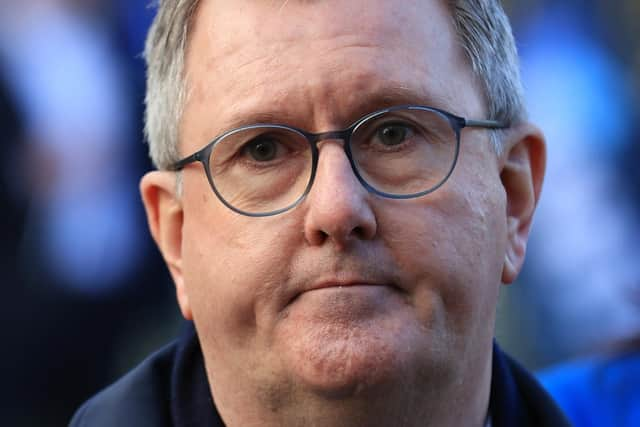Jeffrey Donaldson: Who is the DUP leader who has stepped down after being charged with 'allegations of a historical nature'?


Sir Jeffrey Donaldson’s resignation as leader of the Democratic Unionist Party comes after an almost 40-year run in politics.
The DUP said on Friday that Sir Jeffrey had been charged with “allegations of a historical nature” and that he would be stepping down as leader.
Advertisement
Hide AdAdvertisement
Hide AdThe sudden departure was announced weeks after one of the most significant decisions of his career when he chose to bring the DUP back to powersharing.
Sir Jeffrey assumed leadership of the DUP during a turbulent time for the party which saw it boycott Northern Ireland’s political institutions in protest over post-Brexit trading arrangements.
Unionists had long protested against requirements for checks on goods travelling between Great Britain and Northern Ireland, saying they created an Irish Sea border.
Believing that the Government was not responding fast enough to his concerns, Sir Jeffrey collapsed the Stormont powersharing institutions in 2022.
After protracted negotiations, the party agreed to return to Stormont in February following the agreement of a new deal on trade arrangements and a series of measures aimed at providing assurances around Northern Ireland’s constitutional position within the United Kingdom.
Sir Jeffrey, who is the longest-serving MP in Northern Ireland, became DUP leader in July 2021 following the resignation of Edwin Poots.
He had originally put his name forward to become leader after Arlene Foster was ousted following internal party unrest, but was narrowly defeated by Mr Poots in the DUP’s first ever leadership election months earlier.
Born in Kilkeel in Co Down, Sir Jeffrey first joined the the Ulster Unionist Party (UUP) at a young age.
Advertisement
Hide AdAdvertisement
Hide AdThe 61-year-old has previously spoken about the first time the Troubles affected his family – the murder of his cousin Samuel Donaldson, an RUC constable.
He was the first police officer to be blown up by the IRA in the conflict.
It was this event that influenced Sir Jeffrey’s decision to enter political life.
At the age of 16, he followed his family tradition by becoming a member of the Orange Order, and later followed in the footsteps of his late father Jim by joining the Ulster Defence Regiment (UDR).
In 1985, aged 22, he was elected to the Northern Ireland Assembly, becoming the youngest person to win a seat at Stormont.
His relationship with former UUP leader David Trimble began to crumble over the Good Friday Agreement.
Sir Jeffrey led a walkout of the 1998 peace talks after opposing the early release of republican and loyalist prisoners.
Alongside Mrs Foster, the pair had been part of a tight-knit group dubbed the “baby barristers” who opposed the Good Friday Agreement, the release of paramilitary prisoners and the direction in which then-UUP leader Mr Trimble was taking the party.
Advertisement
Hide AdAdvertisement
Hide AdHe, and Mrs Foster, left the party and joined the DUP in January 2004.
In 2009, Sir Jeffrey apologised for claiming for pay-to-view films on his parliamentary expenses during hotel stays. He repaid the £555 and said he was wrong to submit the claims.
He was recognised by the Queen in her 2016 Birthday Honours and given a knighthood.
Comments
Want to join the conversation? Please or to comment on this article.